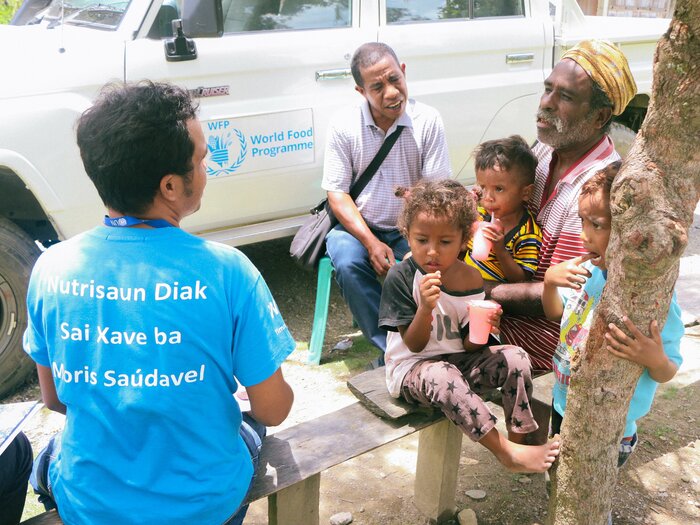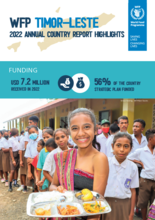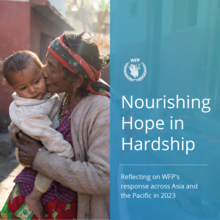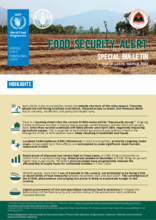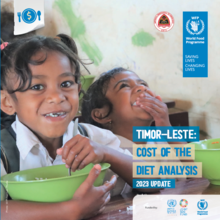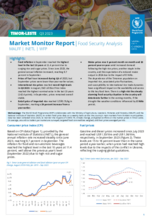Timor-Leste
- 53%
- of boys and 47% of girls are stunted
- 47%
- of children under five years of age are stunted
- 1.3 million
- population
After becoming an independent country in 2002, Timor-Leste is one of the world’s newest nations. The island ranks 141 out of 189 countries and territories on the 2020 Human Development Index and is a predominantly agrarian country with a population of 1.3 million people. More than 45 percent of people are living in poverty, and this is the highest number in Southeast Asia.
Although the country has made significant developmental progress, Timor-Leste still experiences some of the highest rates of under-nutrition in the world. Forty seven percent of children under five years of age are stunted, 8.6 percent suffer from acute malnutrition, and 23 percent of women of reproductive age (15 -49 years) are anemic.
Timor-Leste is a food-deficit country that imports 60 percent of its food, and agricultural productivity is low. The country is vulnerable to climate change and a range of natural hazards, ranking 16th on the World Risk Index in 2021. Disasters such as landslides, flash floods, tropical cyclones, earthquakes, forest fires pose a threat to the livelihoods of more than 70 percent of the population who depend on rain fed agriculture as a main source of income.
What the World Food Programme is doing in Timor Leste
-
Nutrition
-
Improving nutrition is a core element of WFP’s work in Timor-Leste. WFP helps ensure that people - particularly those with high nutrient needs – have access to diverse and nutritious diets year-round. This includes young children, adolescent girls and pregnant and nursing mothers. Fortified food (filled with essential minerals and vitamins) is provided to vulnerable families to help them to boost their nutrition. WFP provides technical support to the government with the aim of reaching the national nutrition targets for children under five, pregnant and nursing women and adolescent girls by 2025.
-
Social and Behavioural Change Communication (SBCC)
-
WFP carries out SBCC activities to promote the importance of healthy dietary practices. This includes holding training sessions for health workers and teachers, producing and the LAFAEK magazine (focusing on eating a balanced diet) that is delivered to more than 206,000 school-aged children, and holding nutrition education sessions for students in 120 nutrition clubs. WFP is working with line ministries and through national food security and nutrition fora to enhance the capacity of national and sub-national institutions to sustainably deliver, monitor, and evaluate social safety programmes including, but not limited to, school meals.
-
Rice fortification
-
WFP is providing technical assistance to the Government of Timor-Leste to introduce and scale up food fortification so that even more families can get the nutrients they need. In 2020, WFP installed a fortified rice blending system in the capital Dili and is raising awareness of the benefits of fortified foods with the public through media campaigns.
-
School feeding
-
WFP is working with the Government to re-start the national school feeding programme. In a milestone move, WFP also supported the Government to join the School Meals Coalition. In 2022, WFP will introduce fortified rice as a part of the school meals programme targeting 79,000 children in over 400 schools in Baucau, Bobonaro, and Manufahi. Rehabilitating kitchens and boosting cooking hygiene practices will also be priorities over the coming years.
-
Logistics
-
WFP Timor-Leste provides the Government and partners with technical expertise to develop an efficient supply chain management system to reach the families who need help the most. During the COVID-19 border closure, the WFP led United Nations Humanitarian Air Service (UNHAS) played a pivotal role in transporting life-saving medical supplies across the country and ensured that humanitarians could reach families in need.
-
Emergency preparedness and response
-
WFP is providing logistics coordination and transport services to Government and humanitarian partners to facilitate ongoing humanitarian responses. WFP is also working with the State Secretariat for Civil Protection to develop an emergency preparedness plan at national and municipality levels.
Timor-Leste news releases
Go to pagePartners and donors
Find out more about the state of food security in Timor-Leste
Visit the food security analysis pageOperations in Timor-Leste
Contacts
Office
WFP Timor Leste, UN House, Caicoli Street, Dili, Timor-Leste Post box No. 133
Dili
Timor-Leste

